- Home
- Mike Lupica
Million-Dollar Throw
Million-Dollar Throw Read online
Table of Contents
Title Page
Copyright Page
Dedication
Acknowledgements
CHAPTER 1
CHAPTER 2
CHAPTER 3
CHAPTER 4
CHAPTER 5
CHAPTER 6
CHAPTER 7
CHAPTER 8
CHAPTER 9
CHAPTER 10
CHAPTER 11
CHAPTER 12
CHAPTER 13
CHAPTER 14
CHAPTER 15
CHAPTER 16
CHAPTER 17
CHAPTER 18
CHAPTER 19
CHAPTER 20
CHAPTER 21
CHAPTER 22
CHAPTER 23
CHAPTER 24
CHAPTER 25
CHAPTER 26
CHAPTER 27
CHAPTER 28
CHAPTER 29
CHAPTER 30
CHAPTER 31
CHAPTER 32
CHAPTER 33
CHAPTER 34
ABOUT THE AUTHOR
PHILOMEL BOOKS
A division of Penguin Young Readers Group.
Published by The Penguin Group.
Penguin Group (USA) Inc., 375 Hudson Street, New York, NY 10014, U.S.A. Penguin Group (Canada), 90 Eglinton Avenue East, Suite 700, Toronto, Ontario M4P 2Y3, Canada (a division of Pearson Penguin Canada Inc.). Penguin Books Ltd, 80 Strand, London WC2R 0RL, England. Penguin Ireland, 25 St. Stephen’s Green, Dublin 2, Ireland (a division of Penguin Books Ltd). Penguin Group (Australia), 250 Camberwell Road, Camberwell, Victoria 3124, Australia (a division of Pearson Australia Group Pty Ltd). Penguin Books India Pvt Ltd, 11 Community Centre, Panchsheel Park, New Delhi—110 017, India. Penguin Group (NZ), 67 Apollo Drive, Rosedale, North Shore 0632, New Zealand (a division of Pearson New Zealand Ltd). Penguin Books (South Africa) (Pty) Ltd, 24 Sturdee Avenue, Rosebank, Johannesburg 2196, South Africa. Penguin Books Ltd, Registered Offices: 80 Strand, London WC2R 0RL, England.
Copyright © 2009 by Mike Lupica.
All rights reserved. This book, or parts thereof, may not be reproduced in any form without permission in writing from the publisher, Philomel Books, a division of Penguin Young Readers Group, 345 Hudson Street, New York, NY 10014. Philomel Books, Reg. U.S. Pat. & Tm. Off. The scanning, uploading and distribution of this book via the Internet or via any other means without the permission of the publisher is illegal and punishable by law. Please purchase only authorized electronic editions, and do not participate in or encourage electronic piracy of copyrighted materials. Your support of the author’s rights is appreciated. The publisher does not have any control over and does not assume any responsibility for author or third-party websites or their content.
eISBN : 978-1-101-10905-2
http://us.penguingroup.com
For my wife, Taylor, and my children, Christopher, Alex, Zach and Hannah Grace: They have given me a world beyond anything I imagined. And become my best friends along the way.
Acknowledgments
Dr. David Hunter, Dept. of Ophthamology, Children’s Hospital Boston, Harvard Medical School. Dr. Stephen Rose, Chief Research Officer, Foundation Fighting Blindness. The great Terry Hanratty, who once lit up college football Saturdays at Notre Dame. Billy Goldman, of Highland Park, Illinois. Esther Newberg. Bene and Lee Lupica, who still make me look for the best in myself. And, of course, Michael Green: I’m just sayin’.
CHAPTER 1
This was always the best of it for Nate Brodie, when he felt the slap of the ball in his hands and began to back away from the center, when he felt as if he could see the whole field, and football made perfect sense to him.
Sometimes when you were thirteen nothing seemed to make sense, and the world came at you faster and trickier than flying objects in a video game.
It was never like that for him in football.
Never.
Nate had been having more and more trouble figuring out his world lately, especially with everything that had been happening to his family. School was school—he tried hard, but there were times he just felt lost, in search of answers that wouldn’t come.
And no matter how hard he tried, how hard he could try, he was never going to make sense out of what was happening to his friend Abby.
But on a Saturday morning like this, underneath all the sun and blue sky, with the guys in the line already into their blocks and Nate feeling as if he had all day to throw the ball—feeling that weird calm he always felt in the pocket—he had all the answers.
Football was like this for Nate Brodie.
As he scanned the field now, he recognized one of those answers he instinctively knew. Pete Mullaney, his favorite receiver, was about to break into the clear. Once he did that, Nate knew Pete was going to run all day.
When it was just Nate and Pete and some of the other guys on the team playing touch football in the empty lot next to Nate’s house, they called this play “Hutchins-and-Go.” One day Nate had told Pete to fake toward the Hutchins’ house, the one on the other side of the lot, fake like he was running a sideline pattern in that direction, and then, as soon as the guy covering him bit, Pete was supposed to plant his outside foot and spin and take off down the sidelines.
The play had just always been called Hutchins-and-Go after that.
Nate watched as Pete sold his fake now, sold it like he was selling candy, didn’t rush, even turned and looked back for the ball. That was when the defensive back on him committed, turned, and looked for the ball himself.
Only Pete was gone.
And the ball wasn’t coming, at least not yet.
Now it was just a question of what kind of throw Nate wanted to make. Because with the kind of arm he had—his buds and teammates always called him “Brady,” knowing that Tom Brady was Nate’s all-time favorite player—there were a couple of ways he could go. Nate could put a lot of air beneath the ball, really hang it up there and let Pete use those jets of his to run under it. Or Nate could gun one right now, throw one of those dead spirals that was the same as one of his football fastballs, put so much sting and hurt at the end of the pass that Pete sometimes said he wished he was allowed to wear a catcher’s mitt.
Nate decided to put this one way up there.
Moon shot.
He rolled to his right now, feeling pressure coming from his left, a right-handed quarterback’s blind side, without actually seeing it. But just to make sure, to know exactly how much time he had, he shot a quick look over his shoulder and saw that the Hollins Hills’ nose tackle had cleared Malcolm Burnley, Nate’s center and the best blocker Valley had, on an outside route and was coming hard, thinking he might have a shot at getting his first sack of the day.
Nate knew he didn’t.
In no hurry, Nate kept moving toward the sideline, toward the Valley bench, almost feeling as if he were floating. Having cleared the pocket completely, a nice patch of open green waited for him a few yards in front of Coach Rivers.
He stopped now, planting, making sure to square his shoulders so he didn’t drop his arm angle and sidearm the ball, setting himself on his back foot, carrying the ball high. The throwing mechanics that Coach said you pretty much had to be born with.
And he let the ball rip.
Knowing that the cornerback who had been covering Pete was never going to catch up with him and that the Hollins Hills safety had no chance of getting over to the sideline in time.
He watched the ball like it was on a string, like one of those perfect casts his dad used to make across the water when the two of them still had time to go fishing together, before his dad began working all the time.
He hoped his mom was getting this on the video recorder that was on its la
st legs and had been for a while, because his dad—working a double shift on Saturdays now—wasn’t here to see it in person.
The ball came down into Pete Mullaney’s hands, Pete in perfect stride, just crossing the Hollins Hills 10-yard line.
Pete pressed the ball to the front of his white uniform with those sure hands of his and crossed the goal line. Then he turned and just tossed the ball to the referee, because if you played on a team with Nate Brodie, if he was the one throwing you the ball, you knew enough not to do some kind of crazy touchdown dance afterward.
You could be happy, just not happy enough to show the other team up.
Nate was running down the sideline now, almost as fast as Pete just had. All the things that were confusing about his thirteen-year-old life lately—the things that made him sad and just plain mad once he got away from a football field—Nate had left them all in his dust.
By the time Nate got to Pete, the little wide receiver was on the Valley sideline, waiting for him with his arms stretched wide. Nate, taller than Pete by a whole helmet, grabbed him, picked him up, put him down just as quickly, as much celebration as he was going to allow himself, mostly because there was still some game left to play.
Pete said, “That throw was legit.”
“You always say that,” Nate said.
“No, Brady, this time I really mean it. That throw was, like, righteous.”
Nate laughed now, couldn’t help it. “I had the wind behind me.”
Pete Mullaney shook his head, smiling from behind his face mask. “Dude,” he said, “as far as I can tell, your arm is pretty much where the wind starts.”
Nate ran over to Coach Rivers then, to get the play Coach wanted them to run on the conversion. Then he ran back on the field and told his teammates he was faking to LaDell and then taking it in himself, on a roll to his left.
Nobody touched him. Valley was up 22-7. They all knew the game was over, even with the clock showing two minutes, straight up, left.
He and Pete ran off the field together, knowing that the forty yarder they’d just hooked up on had put this one in the books.
When Nate got back to the bench, Coach Rivers gave him a simple handshake.
“A Brady throw all the way,” he said.
“I wish,” Nate said.
“I’m serious,” Coach said. “Biggest throw of the season.” For now, Nate thought.
For now.
CHAPTER 2
It had started out almost as a dare from Abby.
They were at the mall a couple of months ago, right after the school year had started, Nate there with Abby and his mom on what they all knew was a very big day for him. He had turned thirteen just the week before, but that wasn’t the big news.
The big news was that after more than a year of saving up birthday money from relatives, Christmas money, and allowance money, Nate finally had earned enough for his share of the football.
And not just any football.
This was the signed Tom Brady ball that he’d spotted in the trophy case at SportStuff the summer after he’d finished sixth grade.
Nate was smart enough about collectibles to know that this wasn’t the only signed football from Brady in the world. He knew from asking the man at the store that this particular ball was part of a new “limited edition” from Brady, and it came with a certificate of authenticity.
“How many are in the limited edition?” Nate had asked the man at the store, and the man, smiling, had said, “Enough for us to charge what we’re charging.”
Five hundred dollars, plus tax.
Nate read about money in sports all the time, read about the money the top athletes, including Tom Brady, were making. Some of them, like LeBron and A-Rod and Tiger Woods, earned up there in the hundreds of millions. But since he’d had his eye on this ball, it wasn’t their salaries that seemed like the biggest number in sports.
It was just the cost of this one signed football.
When he told his mom and dad about it, they told him that if he was willing to save up, if it was the present he wanted the most, they would pay half. It would be a way of earning something off the field the way he always had on it. Or earning a good grade in school, which they always told him should mean even more to him, because they all knew school came harder to him.
And his parents had stayed with the promise even though things were different now in their house than they had been when he’d finished sixth grade. Everything was different now that his dad was working two jobs after losing the only one Nate had ever known him to have, at the big commercial real estate company he used to work for.
His mom had gone back to work, too.
“You don’t have to do this,” Nate had said to his dad one day. “I can wait and save up the whole five hundred myself, even if it does take longer.”
“Actually, I have to do this more than ever.”
“I don’t understand,” Nate said.
“A promise is a promise,” his dad had said, “even if it’s one you make only to yourself.”
For all Nate knew, his parents had been saving up for the Brady ball right along with him, waiting for the day when there was finally enough money in the top drawer of his desk to make the trip to SportStuff he’d been dreaming about for what seemed like forever.
SportStuff had become one of the biggest sporting goods chains in New England. They didn’t just sell the usual “stuff,” sneakers and spikes and jerseys and T-shirts, basketballs and hockey sticks and gloves and bats and balls. The thing that set SportStuff apart was a section of every store known as “The Hall”—as in Hall of Fame. That’s where the coolest stuff in the place really was.
The collectibles, all the signed balls and jerseys and memorabilia, all authentic. Signed sneakers, some of them looking as big as a bathtub to Nate. Baseball and football cards, some real old, some real valuable, perfectly preserved behind or under glass.
But nothing was more valuable, at least to Nate’s eyes, than the Brady ball.
Tom Brady had been Nate’s guy from the time Nate first started playing organized football in the fourth grade and started watching pro football games with his dad on Sunday afternoons. In fact, the first game Nate really remembered watching—or caring about—was Brady’s first Super Bowl against the St. Louis Rams. That was the day he’d driven the Patriots down the field at the end of the game even though he was basically a rookie. Brady had driven them down the field against a Rams team Nate knew from his dad was a two-touchdown favorite, got them close enough to the end zone that Adam Vinatieri could do something he would do again a few years later for the Patriots: kick a field goal to win the Super Bowl as time ran out.
Vinatieri got to make that end-of-game kick again because Brady drove the Patriots down the field again in Super Bowl XXXVIII, this time against the Carolina Panthers.
The first time, though, was the one Nate knew he would always remember best. He didn’t understand everything that was happening in the game, didn’t understand everything the announcers were saying, no matter how patient his dad had been explaining things. Nate just understood in his heart that there was magic in the room that night, not just because he was getting to stay up later than he ever had to watch the ending of a game, but because he was sharing this night and this ending and this one amazing football game with his dad.
Ever since there had been the same kind of magic for Nate every time he watched Brady play quarterback for the Patriots. There was that kind of magic even after Brady hurt his knee and lost that time from the prime of his career. The two of them had shared something important with that first Super Bowl, even if Tom Brady had never known it.
“Anybody can do it when the pressure’s not on,” his dad would say when Brady had turned into Two-Minute Tom again. “It’s when you’re under pressure, when the whole world’s looking at you and your teammates are looking to you, that’s the measure of a champion in sports.”
Now, that day in September at SportStuff, Nate was goi
ng to hand over his money and take home the Brady ball and put it in the case his mom had bought for him on his birthday, the one that was waiting for him back in his room on his desk.
He had called the store right before they made the drive over, just to make sure that he hadn’t miscalculated on the tax. His mom was carrying the envelope with the money in it in her purse. And there the ball was when they got to the store, right where it always was, directly behind the cash register in The Hall, high up on a shelf between a Kevin Garnett basketball and a bat signed by both David Ortiz and Manny Ramirez of the Red Sox.
“I’d like to buy the Brady ball, please,” Nate said, pointing up at it.
The man said, “Sorry, kid, not for sale.”
But he must’ve seen what happened to Nate then, Nate actually feeling his legs buckle, as if somebody had brought him down from behind in the open field. So right away the man said, “Sorry. Bad joke.”
Abby, standing next to Nate, said, “Just a bad joke? You’re being way too easy on yourself, Mister.”
The man laughed. “Who’s she, your bodyguard?”
And Nate had said, “Something like that. Just a lot tougher.”
It was when the ball was in Nate’s hands, a ball that Brady had to have handled if only long enough to sign it with a Sharpie, that Abby had noticed the entry forms.
The man was still counting out the money at the time. While he did, Abby got right up on top of the little poster on the counter and started reading out loud. That was how she and Nate found out that SportStuff was sponsoring a promotion called “The SportStuff Million-Dollar Throw.”
The winner of the contest was going to get the chance to make one throw—from thirty yards away, through a twenty-inch hole—at halftime of the Patriots’ Thanksgiving night game against the Colts.
Whoever made the throw would be handed a check for one million dollars.
The poster showed a picture of the Patriots’ home stadium, Gillette Stadium. At midfield, they’d set up a billboard with “SportStuff ” written in gigantic letters across it.

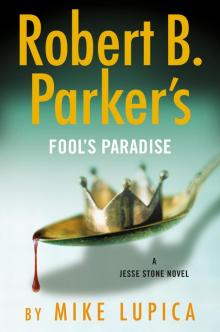 Fool's Paradise
Fool's Paradise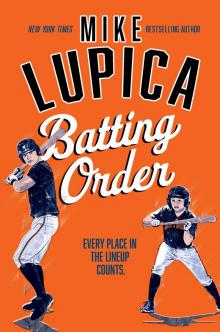 Batting Order
Batting Order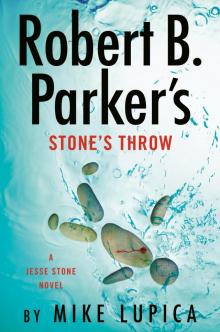 Stone's Throw
Stone's Throw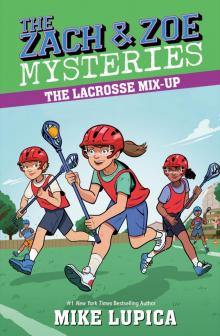 The Lacrosse Mix-Up
The Lacrosse Mix-Up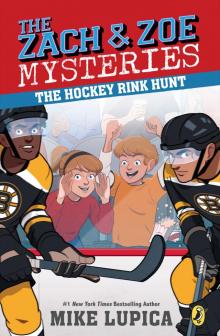 The Hockey Rink Hunt
The Hockey Rink Hunt Payback
Payback Triple Threat
Triple Threat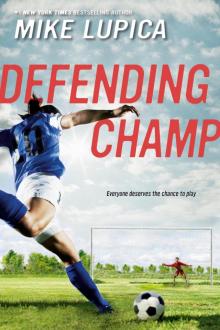 Defending Champ
Defending Champ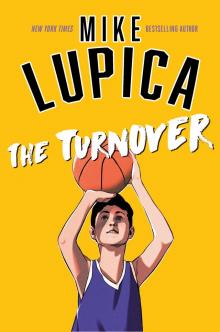 The Turnover
The Turnover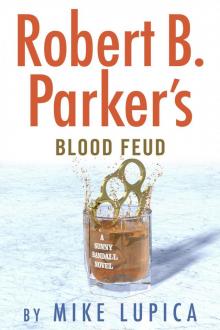 Robert B. Parker's Blood Feud
Robert B. Parker's Blood Feud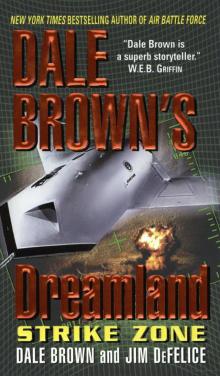 Strike Zone
Strike Zone Hero
Hero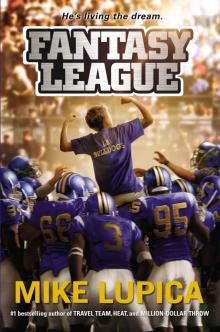 Fantasy League
Fantasy League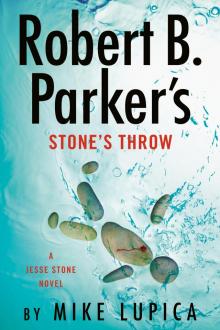 Robert B. Parker's Stone's Throw
Robert B. Parker's Stone's Throw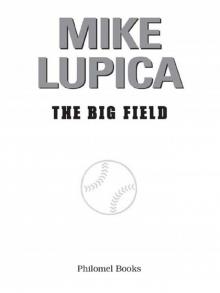 The Big Field
The Big Field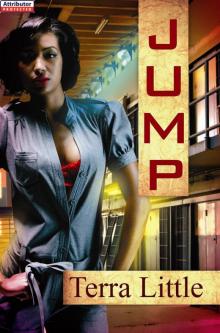 Jump
Jump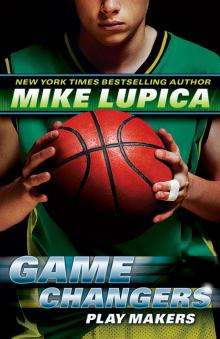 Play Makers
Play Makers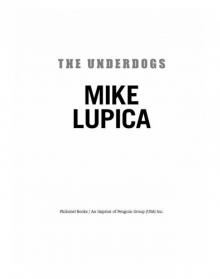 The Underdogs
The Underdogs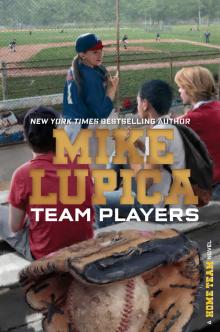 Team Players
Team Players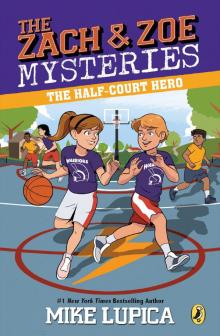 The Half-Court Hero
The Half-Court Hero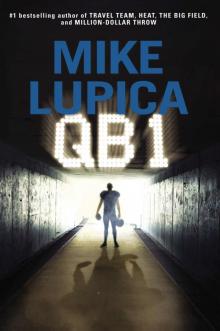 QB 1
QB 1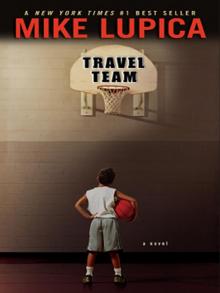 Travel Team
Travel Team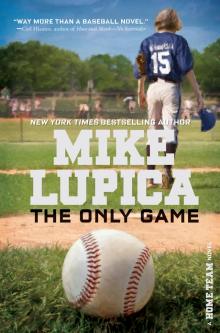 The Only Game
The Only Game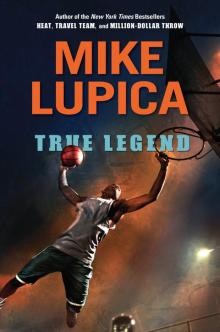 True Legend
True Legend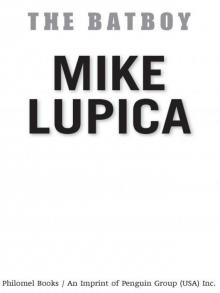 The Batboy
The Batboy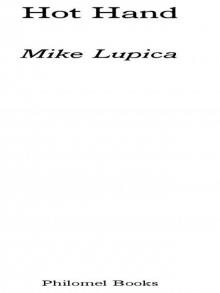 Hot Hand
Hot Hand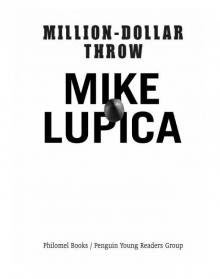 Million-Dollar Throw
Million-Dollar Throw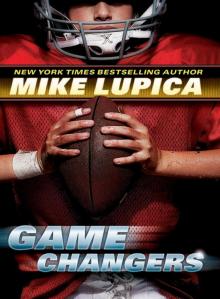 Game Changers
Game Changers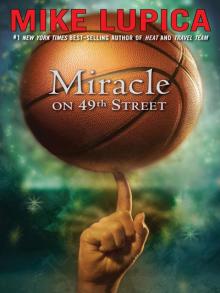 Miracle on 49th Street
Miracle on 49th Street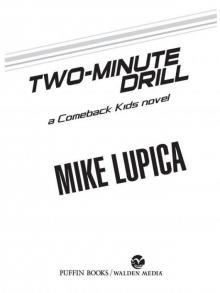 Two-Minute Drill
Two-Minute Drill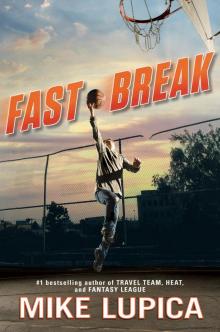 Fast Break
Fast Break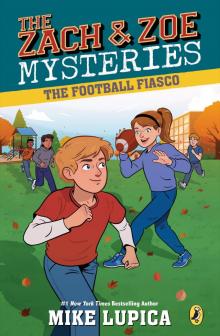 The Football Fiasco
The Football Fiasco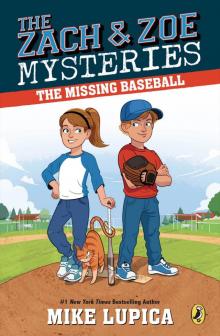 The Missing Baseball
The Missing Baseball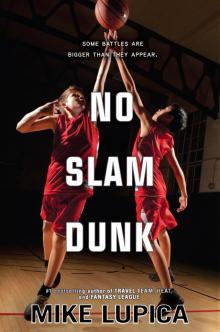 No Slam Dunk
No Slam Dunk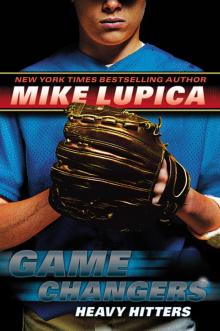 Heavy Hitters
Heavy Hitters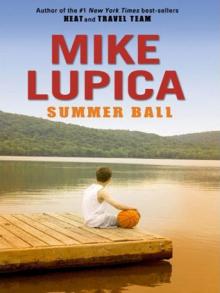 Summer Ball
Summer Ball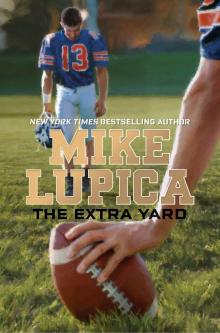 The Extra Yard
The Extra Yard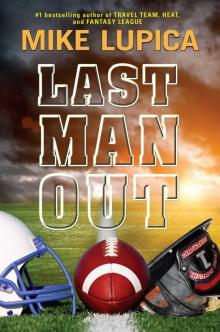 Last Man Out
Last Man Out